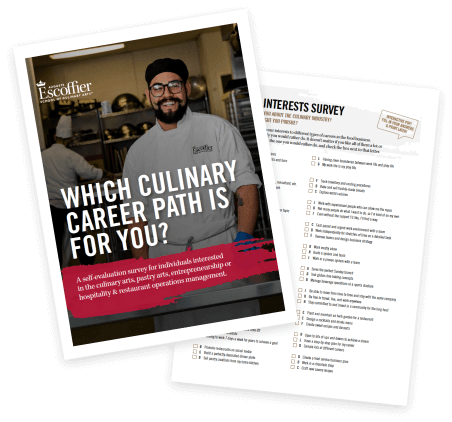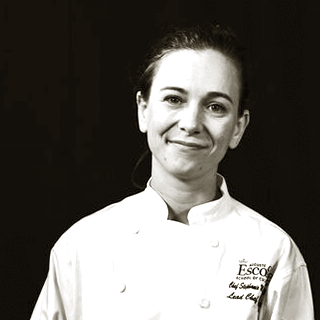Listen to This Article:
What do specialty diets, meditation, and culinary training have in common? They’re all skills that holistic nutritionists might use to help their clients improve their health and wellness. In the last decade, tens of thousands of aspiring foodies with an interest in helping people feel well have been trained as professionals in the holistic nutrition and wellness industry.
If you have a passion for wellness topics like natural and whole foods, focusing on lifestyle changes before medications, and improving mental health, as well as a curiosity about how to cook like a pro, getting trained as a holistic nutritionist might be a way to combine all your interests into one career. Keep reading to learn how to get the training you may need to get started helping clients as a holistic nutritionist.
First of All, What Does a Holistic Nutritionist Do?
Simply put, a holistic nutritionist is a health consultant for people who want support with their diet and nutrition. Clients of holistic nutritionists may need help dealing with food sensitivities, reducing sugar or salt for medical reasons, eating more fruits and vegetables, or need help dealing with food cravings.
Holistic nutritionists provide education, support, accountability, and coaching to people who need or want to make changes. They may provide a type of dialogue called motivational interviewing to help clients draw out their own inner desire to focus on their goals and make improvements.
But as the term “holistic” implies, these types of nutritionists may also provide advice about more than simply food. They may offer support for other types of lifestyle choices that support healthy nutrition, like meditation, regular exercise, or supplementation.
You might find a holistic nutritionist in a medical office, naturopathic practice, or wellness center. They might work one-on-one with clients in an office setting, or they may offer workshops, webinars, or other group services to encourage healthy habits. They might even work in places like nursing homes, schools, or any institution with a meal program.
No matter where or how they provide services to their clients, holistic nutritionists need a solid foundation of training to make sure they are best able to help. Let’s talk about the steps involved in getting started as a holistic nutritionist.

Holistic nutritionists provide diet recommendations, but also support with lifestyle changes, like exercise or stress relief.
Step 1: Complete a Formal Education in Holistic Nutrition
The road to a profession in holistic nutrition begins with education. Holistic nutritionists must be well-versed in human nutrition, as well as how to help people choose the foods that will support their optimal health.
Since holistic nutritionists focus on whole-body wellness rather than just diet, they may also need to be educated in wellness concepts like proper sleep, hydration, and stress management. These core concepts – and communicating them to others – are foundational ideas for holistic health practitioners like holistic nutritionists. And since food is the centerpiece of this work, being a skilled chef or recipe developer can also help a nutritionist succeed.
A quality holistic nutrition training program should cover a range of these topics, as well as train you in coaching skills like motivational interviewing and theories of habit change. A training program should also teach you the skills you need to start and run a holistic nutrition business.
What Should a Quality Holistic Nutrition Program Offer?
A quality holistic nutrition program should at the very least offer the following:
- Extensive training in human nutrition
- Culinary skills, like recipe development, meal planning, and more
- Coaching skills, like motivational interviewing and habit change theory
- Overviews of related wellness topics, like sleep, hydration, stress management, and exercise
- Business skills
- Hands-on training, like an internship or externship
What Kind of Holistic Nutrition Training Should You Choose?
Not all holistic nutrition programs are designed equally. Though cost may be top of mind as you look at your choices, it’s best to first look for a program that gets you closer to the specific health and wellness career you’re interested in.
Are you more curious about counseling your future clients on nutrition? Lifestyle options? Cooking skills? Exercise? Make sure that your chosen program focuses on what you want to offer your clients.
For example, Auguste Escoffier School of Culinary Arts’ programs in holistic nutrition and wellness are designed to provide students with industry-ready skills in nutrition and wellness, underscored by a solid foundation in the culinary arts.
Escoffier’s program also includes training in the essential business skills you may need to run your own coaching practice. This is a program for those who want to combine nutrition support for clients with professional-level culinary skills. This could be used to develop menus and meal plans, recipes for specialty diets, to create a product line of foods for people with special health needs, or to be a custom chef for people with unique dietary needs.

Holistic nutritionists can help their clients get inspired by healthy foods by being creative and skilled chefs themselves.
Should You Choose an Online or In-Person Program?
Holistic nutrition programs may be offered in person or online. If you’re willing to relocate to attend school, in-person training may be right for you. But if you’d rather continue living in your current city or town, an online program like the one offered in Escoffier’s Holistic Nutrition and Wellness Program might be a better fit. Note that Escoffier’s Holistic Nutrition and Wellness programs do not certify you to become a dietitian or nutritionist, which typically require further education
Online programs can be just as rigorous as in-person options, but offer you the convenience of completing school while staying in your current home or job.

Online training programs like the Escoffier holistic nutrition programs allow students to get career training with the convenience of staying at home.
What About Certification and Licensing?
In the US, states have different requirements about who can use the term “nutritionist” and whether or not a license is required beyond a training certificate or diploma. Many states do not require certification in order to provide nutrition services, though there are limits on the kind of care you can legally provide. For example, recommending supplements is similar to prescribing and sometimes disallowed. In other states, only certain types of practitioners with particular levels of training are allowed to provide nutrition care.
Check the laws in your state before practicing holistic nutrition to make sure you’re in compliance.**
Some nutritionists also choose to get board-certified beyond state requirements. The National Association of Nutrition Professionals (NANP) offers a Certificate in Holistic Nutrition. Though not a requirement in order to practice, this board certification can lend your practice credibility and authority.
**State laws and licensing requirements are subject to change at any time. Always consult your state’s current laws before embarking on any new business venture, including working as a nutritionist.
Step 2: Get Real-World Experience Working with a Holistic Nutritionist
Once you’ve gotten your initial education as a holistic nutritionist, it’s time to put your skills to the test in the real world. A great way to dip your toe into the world of practicing as a holistic nutritionist is to complete an internship, externship, or other supervised training with a seasoned coach. Most training programs will require some kind of practicum as a graduation requirement.
For example, Escoffier’s Holistic Nutrition and Wellness program requires students to complete a hands-on industry externship. This experience allows them to practice skills learned in the classroom and get a feel for what the industry really looks like.

New holistic nutritionists may work with more established practitioners to gain more experience in the industry before setting out on their own.
Step 3: Get Working as a Holistic Nutrition Practitioner
Whether you’re working under a more experienced holistic nutritionist or heading out to start your own business, the final step is to start working directly with clients.
After graduation, many new holistic nutritionists prefer to spend some more time working under an experienced practitioner as they get started.
A quality training program will offer support to help you find the right job placement after graduation. For example, Escoffier provides students with career services for resume assistance and interview preparation that help them secure that first job after graduation.*
*Information may not reflect every student’s experience. Results and outcomes may be based on several factors, such as geographical region or previous experience.
Holistic nutritionists can support a variety of healthcare and wellness establishments. They could offer their services at gyms or training centers, provide pre- and postnatal wellness counseling at birthing centers, or work at a standalone nutrition clinic.
You might also want to start your own coaching business, culinary consulting practice, or even become a private chef for people with health conditions. If you’re setting up your own business, you’ll be responsible for bringing in clients. First and foremost, you’ll want to get crystal clear on the types of clients you want to serve, and develop your ideal client avatar. Then, you’ll need to put your business training to work by building a strong online presence, including a website and social media accounts, developing referral networks with other healthcare providers, and finding creative ways to offer your services. For example, you could host in-person or virtual workshops, table at local health events, or offer free introductory sessions.

To create your own holistic nutrition business, you’ll need to get creative to bring new clients in the door. Escoffier’s Holistic Nutrition and Wellness Program can teach the business skills you may need to succeed.

Take the Culinary Career Survey
We’ve compiled a checklist of all of the essential questions into one handy tool: career options, culinary interest surveys, educational opportunities, and more.
No matter how you choose to work in the holistic nutrition field, there’s no doubt that helping people feel better is a feel-good job prospect. It turns out that it’s also a growing industry.
Job Outlook for Holistic Nutritionists
The job outlook for dieticians and nutritionists is excellent. According to the US Bureau of Labor Statistics, the projected job growth in the holistic nutrition industry from 2023 to 2033 is 7%, which is higher than average, while the average salary is $69,000 and the average hourly wage is $33.50.
Why so much opportunity? Besides the American public’s interest in things like whole foods, mind-body medicine, and organics, there is also a chronic disease epidemic in the US. The CDC estimates that approximately 50% of adult Americans have one chronic disease, such as heart disease, high blood pressure, or diabetes, while approximately 42% have at least two. Many of these chronic conditions are affected by diet and lifestyle choices. Enter holistic nutritionists. For consumers who prefer to improve their health condition without medications if they can, practitioners like holistic nutritionists are a valuable option.
In other words, there is ample opportunity to both make a decent living and to help people live a healthier life by getting trained as a holistic nutritionist.
Certain cities also have a strong wellness culture, which could make them excellent for finding work and clients. According to MindBodyOnline, the 10 healthiest cities in the United States as of 2020 are:
- Miami, FL
- Atlanta, GA
- San Francisco, CA
- Denver, CO
- Austin, TX
- Seattle, WA
- Washington, DC
- Tampa, FL
- Minneapolis, MN
- Raleigh, NC
Of course, that doesn’t mean there aren’t great opportunities for holistic nutritionists in other cities or countries around the world! In some places lacking healthier populations, there may be even more opportunity or demand for holistic nutritionists.
Become a Holistic Nutritionist Yourself
To become a holistic nutritionist is to embark on a journey of health—both your own and that of your clients. It’s a career that helps people heal, inside and out, so they can live their happiest lives and be the best versions of themselves. If you’re passionate about food and wellness, imagine how good it would feel to blend these two interests to encourage a healthier world. And this fulfilling career path is growing faster than ever, making now a great time to get into the wellness field.
Escoffier is ready to help you realize your holistic nutrition career goals. Our online Holistic Nutrition and Wellness diploma or degree programs can be completed in as little as 60 weeks, and cover all the topics you may need to succeed in the rapidly growing healthy eating and nutrition sector. Reach out to our Admissions Department to learn more about the program and your education options.
TO LEARN MORE ABOUT NUTRITION AND WELLNESS, TRY THESE ARTICLES NEXT:
- What is Holistic Nutrition & Wellness?
- What Does a Nutrition Coach Do?
- What Exactly is a Plant-Based Diet and Is It Right For You?
This article was originally published April 15, 2022 and has been updated.


